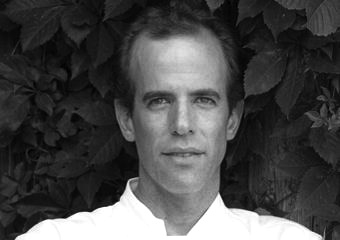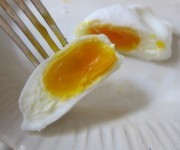 “I have a theory, and I don’t think you’re gonna like it.” Justin was seated across from me at a communal table in a “Secret Restaurant.” We had met not half an hour before, but were now deep in discussion about what chickens should eat to produce the best-tasting eggs — an obsession of mine recently.
“I have a theory, and I don’t think you’re gonna like it.” Justin was seated across from me at a communal table in a “Secret Restaurant.” We had met not half an hour before, but were now deep in discussion about what chickens should eat to produce the best-tasting eggs — an obsession of mine recently.
“I think they’re carnivores,” my new friend finally revealed, with a devilish twinkle in his eyes. I was pretty positive he was wrong.
I’ve been a backyard egg farmer for just a few months now, and my eggs are good, but I’m going for Italy-good.
I spent a semester in Rome during college; my classes were easy and I mostly focused on making dinner for my roommates. The dollar was strong and my Italian was decent. I shopped from two different vegetable guys, a wine guy, a salami guy, and a big fat butcher. I’d get my eggs at the supermarket but they were special and delicious. Their rich, creamy, deep orange yolks were like nothing I had seen. I would whisk a few whole eggs in a big bowl, grate in Parmigiano until my arm got tired, and add copious amounts of black pepper before tossing in hot pasta and serving. The eggs were the star of this meatless carbonara — they coated the pasta in a nourishing and perfect way.
Lately, I’ve been wondering what I have to feed my chickens to recreate that pasta here in Brooklyn.
I started my search for advice with the cookbook author and teacher Giuliano Bugialli. He said that the Italian chickens that make really orange yolks have brown and “shining” feathers and eat mostly dried whole corn and grains. “Even farro when it was not fashionable as it is now,” he said, adding, “I have never seen such chickens in the U.S.”
Harold McGee, in his indispensible book, On Food and Cooking, confirms that the yellow color of egg yolks comes from eating corn, as well as alfalfa. This I could do, but Bugialli had suggested that the real magic might lie in the breeding. Next I emailed Mario Batali. He chalks the quality of Italian eggs up to their pasture-based lifestyle that allows them to eat all the bugs and grubs they can find. “Homogenized chicken feed is just an accelerant (to make chickens grow faster) and doesn’t add to the flavor of their eggs,” he said.
Dan Barber, the co-owner and executive chef at Blue Hill and Blue Hill at Stone Barns, shed some light on the question of color. “It’s from alfalfa, and often that’s extracted into pellets, he said.” But Dan, who grew up farming, added: “Eggs like that could still be missing out on other nutrients of a pastured diet.” He said that some producers also feed chickens marigolds to add color to egg yolks. But if the rich color comes from a natural, varied diet, Barber believes it does reflect the eggs’ nutrition and flavor.
Bronwen Hanna-Korpi worked on a farm outside Siena and holds a Masters degree from a Slow Food-affiliated university in northern Italy. Talking to her fueled my fear that my chickens were too urban and too American to compete with the best. She said she’d used a standard organic corn mix in Italy, but agreed that pasture living was key.
My birds do eat bugs and worms from our compost, plus lots of greens from the garden and scraps from the kitchen, but it must not be the same as foraging for themselves. Maybe Italian bugs are better. Maybe even Italian weeds are better.
 Nina sought chicken feed advice from chef and farmer Dan Barber. “There’s nothing that can replace a pasture,” he told her. “We just don’t know what exactly happens when chickens are able to forage outside.”“Flavor is the synthesis of micronutrients,” Dan Barber told me, attributing the very essence of deliciousness to both science and mystery (as he is prone to doing). “There’s nothing that can replace a pasture,” he told me. “We just don’t know what exactly happens when chickens are able to forage outside, and express their full chicken-ness. Maybe it’s the moon, maybe it’s the attitude of the flock. We’re so far from figuring that out, and that’s what’s so beautiful about nature.”
Nina sought chicken feed advice from chef and farmer Dan Barber. “There’s nothing that can replace a pasture,” he told her. “We just don’t know what exactly happens when chickens are able to forage outside.”“Flavor is the synthesis of micronutrients,” Dan Barber told me, attributing the very essence of deliciousness to both science and mystery (as he is prone to doing). “There’s nothing that can replace a pasture,” he told me. “We just don’t know what exactly happens when chickens are able to forage outside, and express their full chicken-ness. Maybe it’s the moon, maybe it’s the attitude of the flock. We’re so far from figuring that out, and that’s what’s so beautiful about nature.”
Oh, Dan Barber, you make so much sense, and yet it’s so inconvenient for me. He tried to reassure me: “I’m not making a statement against raising backyard chickens. I think it’s great, and fun, and important, but if it’s about having the best food, you’d have to put them in a pasture.” I offered that I might grow grass in their run in the spring. “A miniature pasture,” I pleaded, withering. “Sure,” he said, “stick a herd of bison in there and you’re set.” Oy.
Rob Thompson, the herdsperson at Thanksgiving Farm at the Center for Discovery in Harris, N.Y., had some suggestions for recreating the forage experience. “If we don’t supplement the hens during the winter months, the yolk color changes drastically,” he said, suggesting dry grass, legume hay, kelp meal, and fermented hay.
Danny Williamson, of the heritage poultry farm Good Shepherd Turkey Ranch, in Tampa, Kan., said the best eggs he’d ever eaten were also in Rome. He had a theory about Italian farmers. “They have access to great fish oil and fish meal. Our company would love to be able to use fish meal or fish oil for protein, but so many of our customers object to that.” He explained that people are fearful of animal byproducts and hence the labels on so many egg cartons guaranteeing a vegetarian diet. (This selling point has perplexed me since we got our chickens — it’s undeniable that they eat worms and bugs.)
Fish meal! Fish oil! My customers don’t object to that. I don’t have customers! I was hopeful again. My dinner party friend Justin might have been pushing it when he called chickens carnivores, but he was right: They do naturally eat meat.
Lynn Mordas produces delicious eggs at Dashing Star Farm in Millerton, N.Y. Her 350 chickens roam free on pasture, eating worms and grubs and grass. She doesn’t feed her hens fish or meat because it would attract hawks and vultures to her pastures. But she doesn’t deny that chickens naturally crave some animal protein. In fact, she described their thirst for blood with a combination of admiration and unease. “I have seen them ripping apart live mice and voles in the barn. They will also cannibalize their own eggs and peck at a deceased member of their own flock (killed by a hawk or dying of natural causes), given the opportunity.”
Well, I don’t have vultures or hawks in my pasture! I don’t even have a pasture! But I can satisfy my hens’ carnivorous instincts, which must be connected to their nutritional needs. Mordas warned me not to give the birds more meat or fish than they could consume quickly, so as not to attract rats. Okay! She also suggested I photograph the yolks as I experiment. Done! How could I have doubted urban farming? What I lack in land, I will mimic to the best of my abilities, without threat of predators or the limitations of big business. All I need is a barter deal with a butcher and a fishmonger for scraps, some alfalfa, and a sprinkle of kelp meal.



